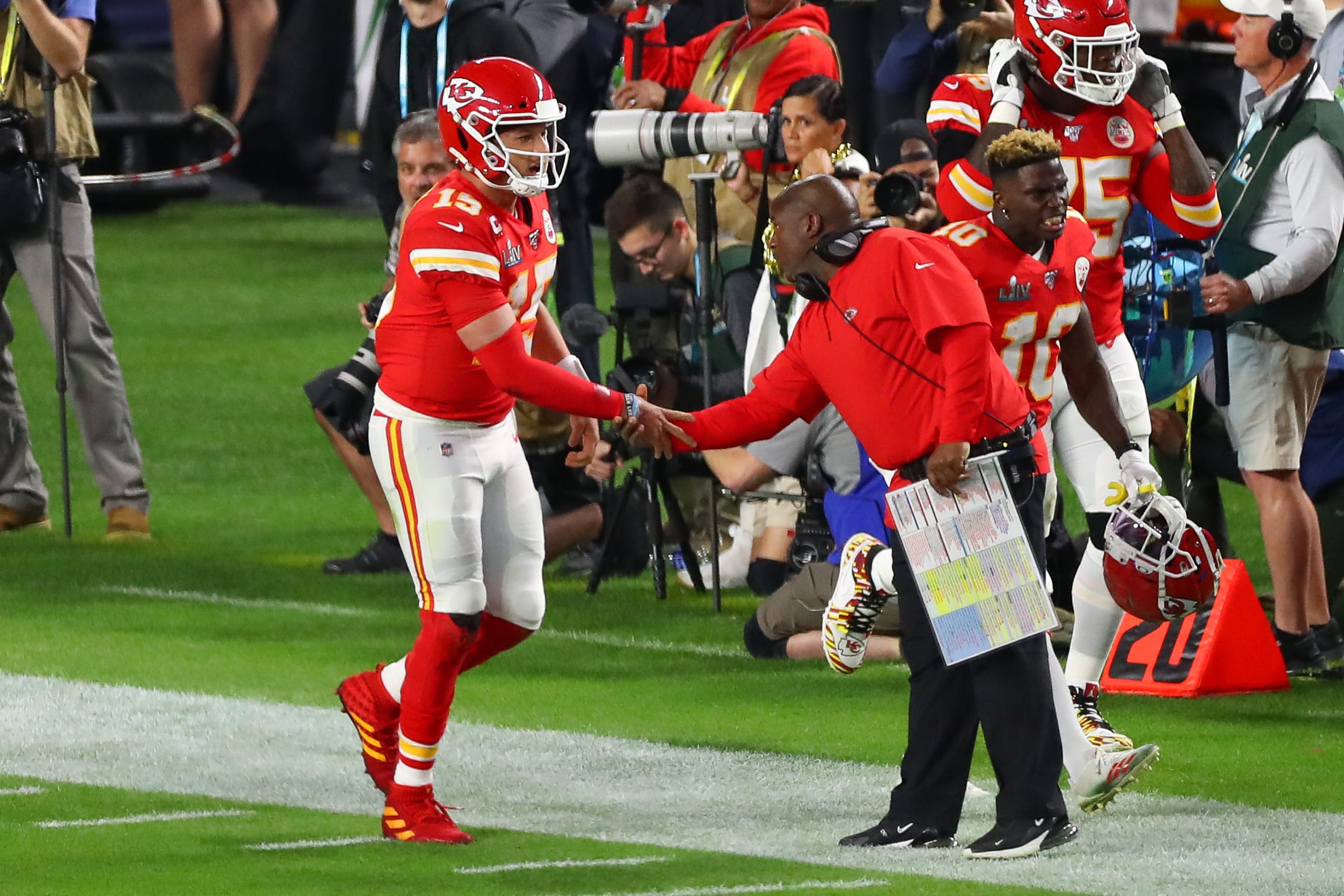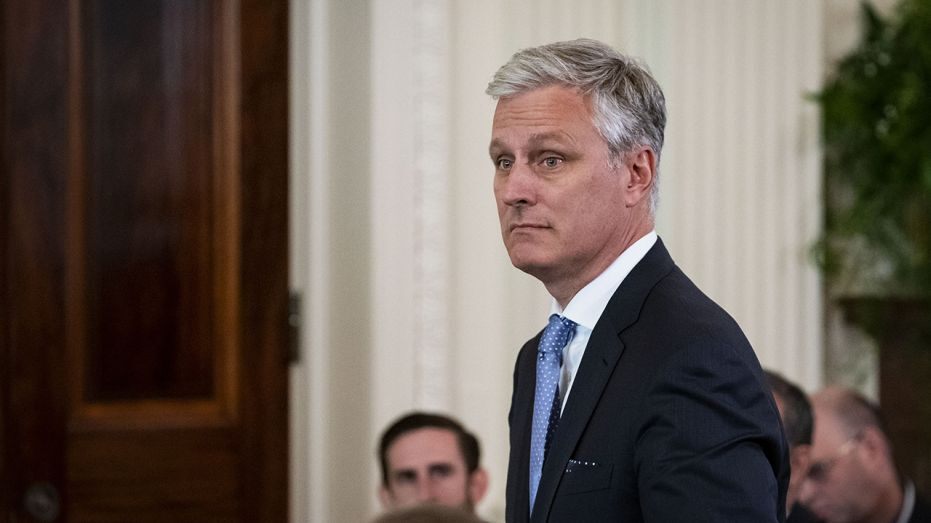
Kansas City Chiefs Quarterback Patrick Mahomes (15) shakes hands with Kansas City Chiefs offensive coordinator Eric Bieniemy after scoring a touchdown during the first quarter of Super Bowl LIV on February 2, 2020 at Hard Rock Stadium in Miami Gardens, FL.
Rich Graessle | Icon Sportswire | Getty Imagaes
The National Football League has completed phase one of its Rooney Rule expansion, which officials hope will make up lost ground with improving diversity throughout the league.
After the 2019 season, only one of five vacant head coaching slots was filled by a minority coach – Ron Rivera in Washington. According to research complied since 2009 by Arizona State University, the NFL has never had more than eight minority head coaches, while white coaches represented as many as 28 (in the 2013-14 season).
Among the changes team owners approved on Tuesday is increasing the number of candidates who interview for head coaching jobs. Teams will now be required to speak with two minority candidates. They’ll also have to speak with at least one minority candidate for all coordinator and executive positions.
But one of the items that received backlash was a plan to incentivize minority hiring with draft picks. NFL commissioner Roger Goodell said owners decided to “table” the idea for more discussion.
Former NFL coach Tony Dungy told CNBC most of the “good” changes from the proposal didn’t receive a “lot of exposure” as conversations around the draft incentives took the spotlight.
Diversity data
A key component in the plan includes retrieving in-depth information from every position throughout each team’s football and business operations.
Dasha Smith, NFL executive vice-president and chief people officer, formed the idea to collect “various diversity data” such as age, gender, race, and “generational,” which Smith said can be collected to project “how many people are going to think about retiring.”
“We’re not just collecting the information on minorities. We’re collecting information on…overall demographics for every position you can imagine at a club and the league office.”
NFL executive vice-president of football operations Troy Vincent said the system would be “universal” and track diversity metrics.
“It’s never happened before – from the league office in New York, New Jersey, Los Angeles, and all 32 clubs. A centralized data collection so we can truly measure,” he said.
The system will also keep track of former minority coaches who haven’t received another head coaching offer. Harrison mentioned past head coaches like former Arizona Cardinals coach Steve Wilks and former Tampa Bay Bucs coach Raheem Morris, before asking: “How do they get reshuffled after their first opportunity to be in a major leadership role?”
Dungy used New England Patriots head coach Bill Belichick as his example. Before leading the Patriots to dominance, Belichick’s first stint as a head coach came with the Cleveland Browns in 1991.
“They didn’t win,” Dungy said of the Browns, who finished 36-44 under Belichick’s tenure. “But he got to bounce back and got another opportunity and ended up winning six Super Bowls. That should be an object lesson for all of us. But it doesn’t always happen that way.”
The ‘mobility’ issue
Vincent said this new data could help combat the NFL’s “mobility” issue, where teams seldom promote minorities into head coaching positions.
“To dive deeper and look at the nuances, you have to look at mobility,” said Dr. Keith Harrison, an associate professor at the University of Central Florida who helps compile the university’s NFL diversity report card. The 2019 grade was downgraded to B-minus overall.
Harrison said the NFL’s new data will help teams identify up and coming talent.
“It will be key in the fact that it’s not anecdotal and it’s not hearsay. It’s scientific, it’s practiced, and it’s going to be systemic,” he said.
Dungy said team owners tend to look at playoff teams and offensive coordinators when filling head coaching slots. Arizona State’s report found 40% of coaching hires made since 2009 have come from offensive backgrounds — and 91% of the coordinators since that time are white.
But right now, there are only two minority offensive coordinators in the NFL, including Eric Bieniemy of the Kansas City Chiefs. Bieniemy helped the Chiefs win Super Bowl LIV but was still passed over for three jobs he interviewed for, including the Carolina Panthers, who instead hired Matt Rhule — a college coach with no NFL experience.
Pittsburgh Steelers owner Art Rooney II noted criticism that minorities were not being given opportunities to develop on the offensive side.
“We’ve talked about that and been looking at ways to make sure we are developing minority coaches,” he said.
Former NFL Coach Tony Dungy speaks during the 2019 Athletes in Action/Bart Starr award at the 32nd Annual Super Bowl Breakfast during Super Bowl LIII week on February 2, 2019 at the Marriott Marquis in Atlanta, GA.
Rich Graessle | Icon Sportswire | Getty Images
Despite all the good efforts, owners are key to making actual change.
The NFL can collect tons of data on diversity. It can implement new systems, and even get organizations like the Fritz Pollard Alliance to back its efforts.
But will owners use the data or ignore it? Will they follow the letter of the changes while thinking of new ways to circumvent them — what Dungy called the “spirit” of the Rooney Rule?
“We have found out that you can’t legislate it,” Dungy said. “I think the thing is we’ve got to show owners it’s going to be good for them, it’s going to be good for business.”
“If you broaden your horizons, think outside the box, you can make your team better,” Dungy continued. “You can be more successful. Somehow, that’s what we’ve got to get across.”

